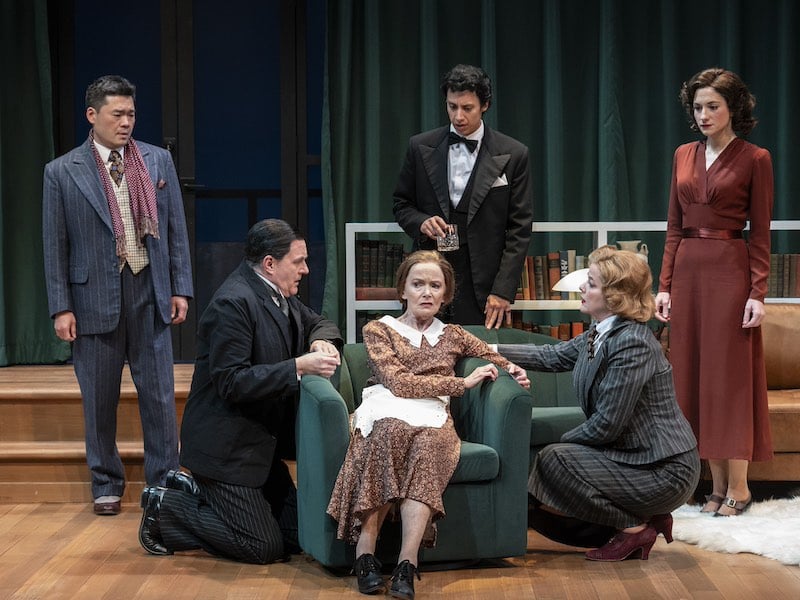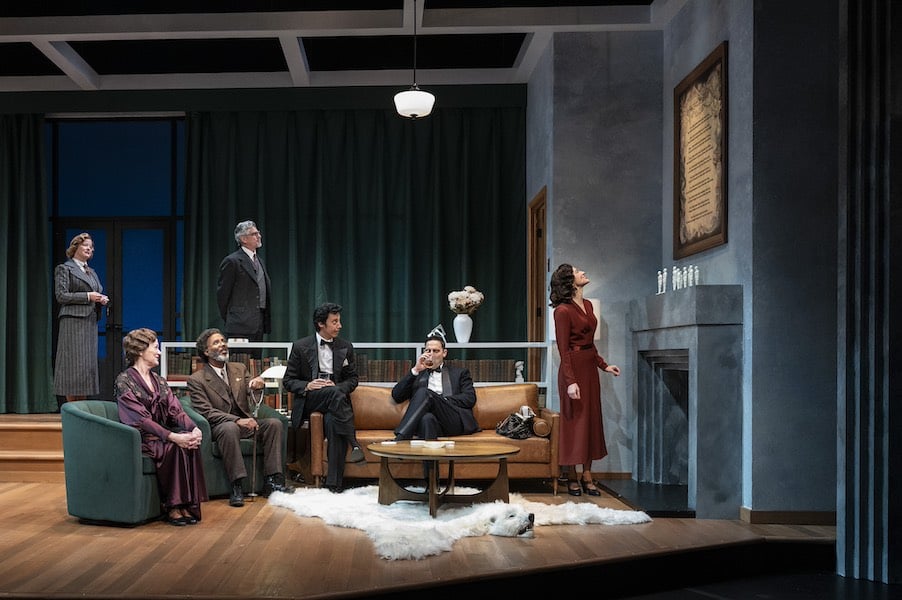Oh, the beauty of Soldier Island. The extravagance. The quiet. The solitude. The murder. That’s right, how else should you spend your quick trip to an isolated island than trying to escape the hands of a murderer? Currently onstage at Everyman Theatre is And Then There Were None, written by infamous playwright Agatha Christie and directed by Noah Himmelstein. Its classic intrigue, plot twists, snippy comments, and traditional English accents will keep you at attention.
On this beautiful, isolated island off the coast of Devon, England, in August 1939, the mysterious delayed “hosts,” the Owens, have invited their ten guests to a simple but elegant home. Surrounded by their past misdeeds, the guests are fighting time, a rhyme, and each other to stay alive. They must confront their pasts as the soldiers continue to fall and bodies pile up if they hope to make it off the island.

The set design by Paige Hathaway eased you into the main living space with large windows and beautiful furnishings. With the details in the sounds of the ocean and the lighting of the day, you could practically feel and smell the salty air on your face. A deserved round of kudos to Sun Hee Kil for sound design and Harold F. Burgess II for lighting. They added the needed touch to make this play come alive.
While the entire cast did an amazing job ferreting out the killer, there were standouts that grabbed your attention. Emily Brent, portrayed by Deborah Hazlett, was the epitome of the callused and cold old lady who represents the dying generation of “common decency.” Extremely rude and judgmental, dear Emily Brent shows how polite society can wreak havoc on the rest of us. While you wanted to hate her, I’m sure a lot of people can relate to her. Especially as you watch yourself go from young to old and state some of the very same things that spilled out of her mouth.
I also appreciated Tony Nam’s Willaim Blore character. Always hungry. Either for actual food or the identity of the killer. His theories on the identity of the murderer will keep you entertained. Especially considering how compromised his own character is. The fact that the secretary kept forgetting his name during the introductions adds another layer to his own identity issues. In the back of your mind, there is always a shadow of a doubt about who he really is. Unless there is a tin of biscuits in front of him. Then, he is a hungry person, regardless of who is dying around him.

Then there was General Mackenzie, represented by James J. Johnson. I appreciated that you were never quite sure of his mental stability. Quiet but respectable, he initially gave you gentle old man just simply living his remaining years in quiet repose. But when you begin to discover how very disturbed he is, it is unsettling. To watch the careful veneer he portrayed to the world crack and then fall into shattered pieces was glorious. The amount of skill it takes to transform sanity into quiet horror seamlessly is master-level talent.
I also enjoyed the roguish character of Dr. Armstrong, wonderfully acted by Megan Anderson. She was what most consider a daring woman of her time, from driving long distances by herself to her career as a surgeon to her current career choice related to helping folks settle their nerves. She is no one’s wallflower. She immediately draws attention to herself not through blatant sexuality but with intelligence and confidence. It was fascinating to watch the onion unpeel as she brought her true self to light.
The drawback for me was my inability to be able to read the fortune-telling poem for myself that was framed above the fireplace mantle, and sometimes it was a little hard to understand the actors due to the accents and low volume of their voices. But in all, it was a nice afternoon diversion.
While you spend the entirety of the play trying to figure out who did what when, I think the real lesson being brought to the forefront is that actions have real consequences that will ripple into your future no matter how much you try to hide it or reframe it in your mind’s eye. The truth does not disappear just because you decide to remember it through the tint of rose-colored glasses.
Running Time: Two hours plus one 15-minute intermission.
EXTENDED: Agatha Christie’s And Then There Were None plays through January 12, 2025, at Everyman Theatre, 315 West Fayette St., Baltimore, MD. Purchase tickets ($48–$80) online or contact the box office by phone at 410-752-2208 (Tuesday–Thursday10–4 and Saturday 12–4) or email boxoffice@everymantheatre.org.
Accessibility: Everyman emphasizes its commitment to accessibility for all, including those with economic challenges, with Pay-What-You-Choose prices.
The program for Agatha Christie’s And Then There Were None is available here.
COVID Safety: Masks are encouraged, though not required. Everyman’s complete health and safety guide is here.
Agatha Christie’s And Then There Were None
Directed by Noah Himmelstein
CAST
Dr. Armstrong: Megan Anderson
Philip Lombard: Danny Gavigan
Emily Brent: Deborah Hazlett
Mrs. Rogers: Helen Hedman
General Mackenzie: James J. Johnson
Fred Naracott/Anthony Marston: Benairen Kane
Vera Claythorne: Hannah Kelly
William Blore: Tony Nam
Rogers: Bruce Randolph Nelson
Sir Lawrence Wargrave: James Whalen
CREATIVES
Set Design: Paige Hathaway
Costume Design: David Burdick
Lighting Design: Harold F. Burgess Ii
Sound Design: Sun Hee Kil
Wig Design: Denise O’brien
Dialects: Gary Logan
Fx, Fights, & Intimacy: Lewis Shaw
Stage Manager: Cat Wallis
Assistant Stage Manager: Juancarlos Contreras



